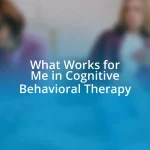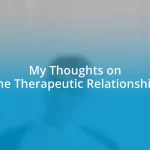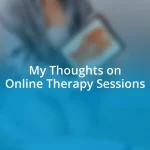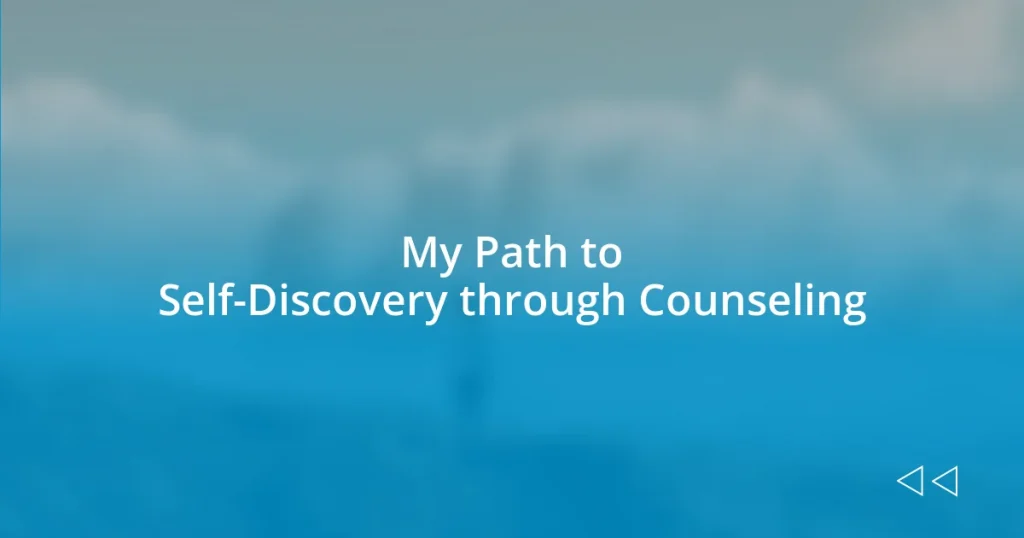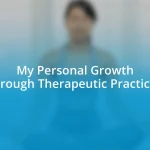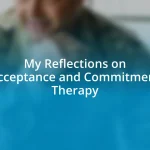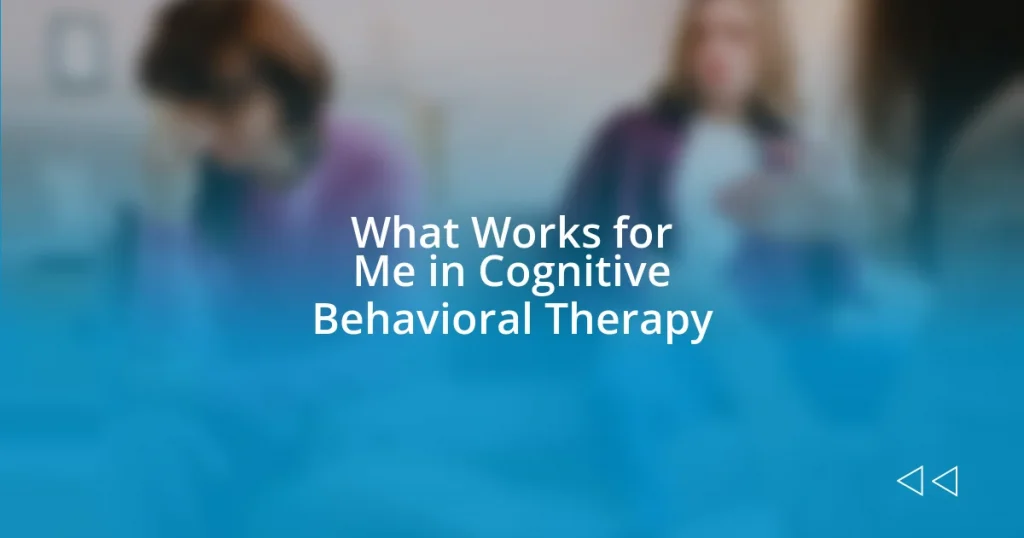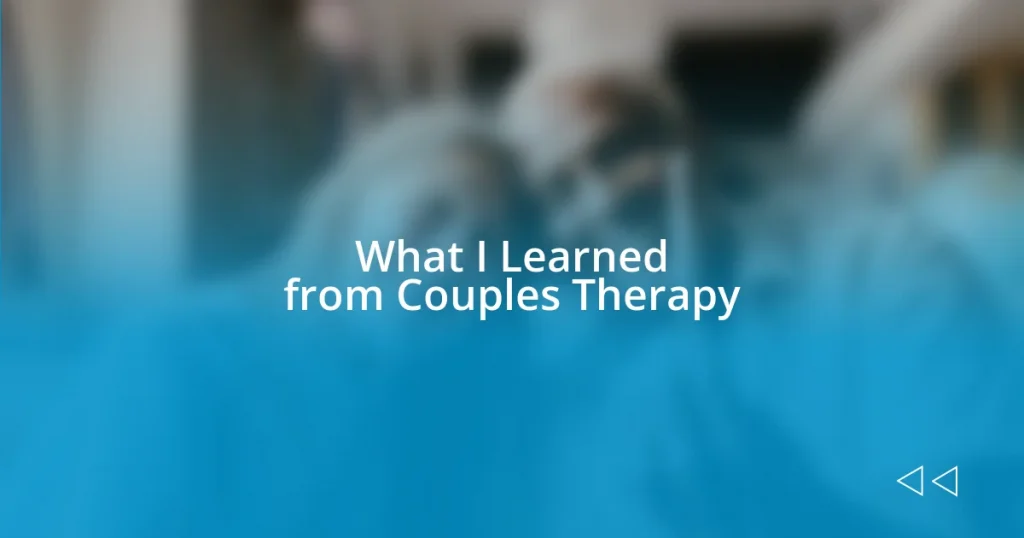Key takeaways:
- Self-discovery is an ongoing journey of exploring personal values and confronting uncomfortable truths, leading to a more authentic self.
- Recognizing the need for counseling involves acknowledging signs of emotional distress and understanding that seeking help is a strength.
- Integrating lessons from counseling into daily life, such as self-compassion and mindfulness, can positively transform one’s perspective and promote resilience.
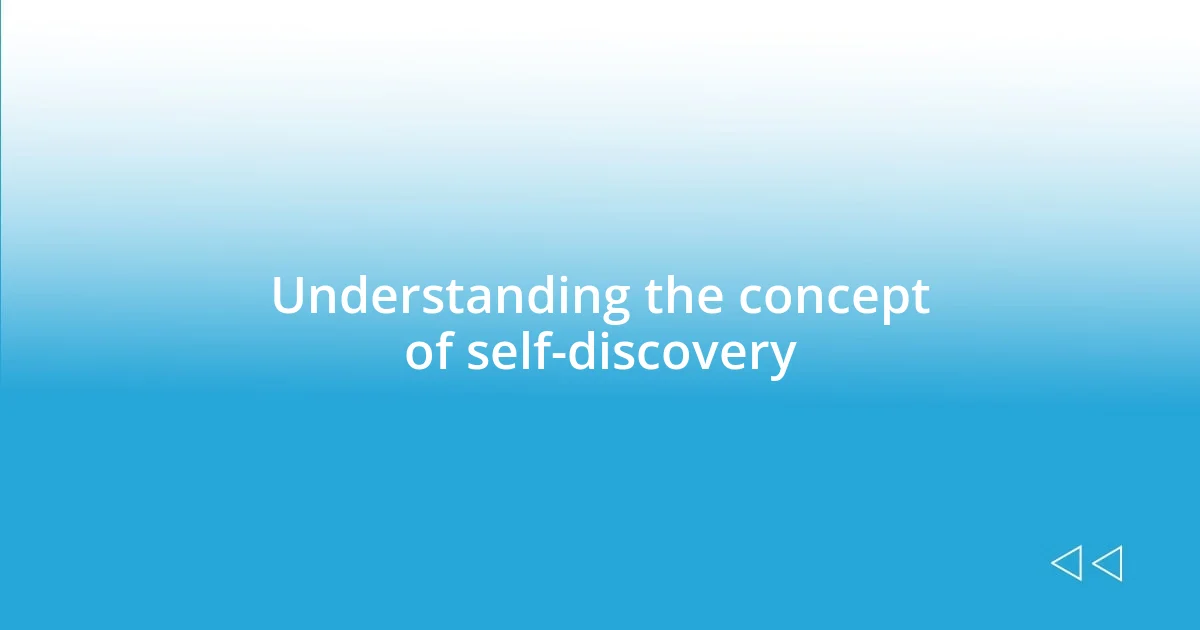
Understanding the concept of self-discovery
Self-discovery is a deeply personal journey that prompts us to explore our values, passions, and fears. I remember sitting in a quiet counseling room, grappling with questions like, “Who am I, really?” and “What do I want from life?” Such moments can feel daunting, yet they often lead to profound insights about ourselves.
Many people perceive self-discovery as merely a phase, but I believe it’s an ongoing process. There was a time when my idea of success was heavily influenced by societal standards. Yet, through counseling, I learned to question these benchmarks. I found joy in crafting my own definition of success, tailored to my individual dreams and values.
As we peel back the layers of our identity, we often encounter uncomfortable truths. Have you ever felt that longing to understand why certain emotions resurface during specific situations? That’s part of the beauty of self-discovery—it allows us to explore those feelings and motivations that shape our behaviors. Each revelation can feel like a stepping stone, guiding us toward a more authentic self.
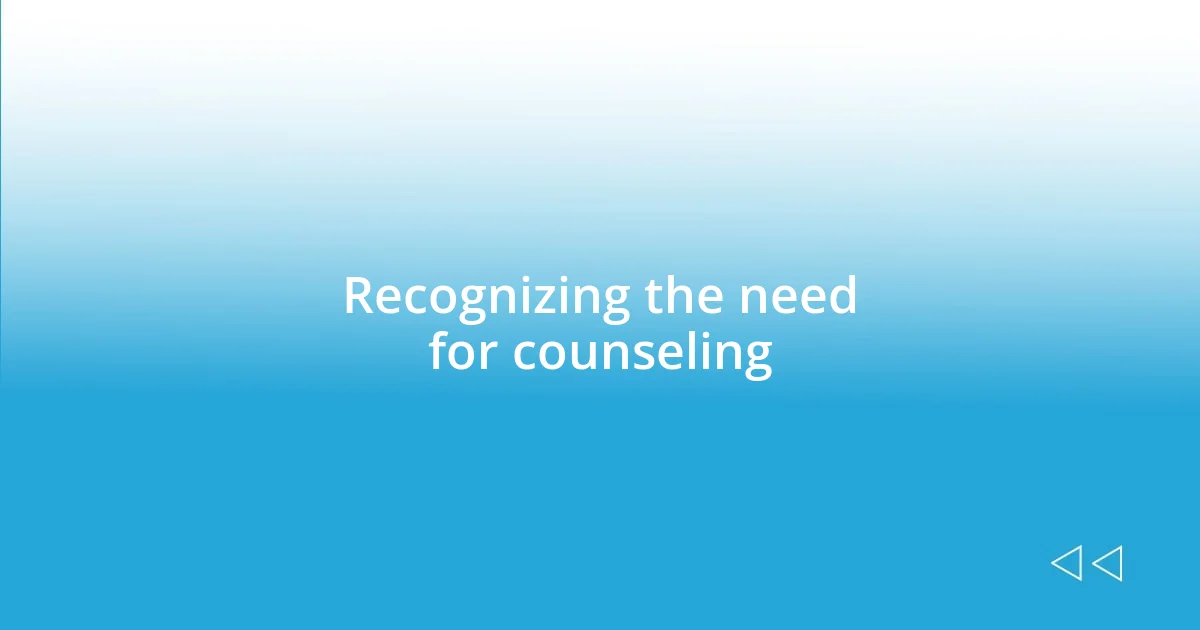
Recognizing the need for counseling
Recognizing the need for counseling can often feel like a pivotal moment in one’s journey. I distinctly recall my own hesitation before seeking help; I was weary but unsure of where to turn. Sometimes it takes a gradual realization—a series of stressors or a lingering feeling of discontent—to recognize that we might benefit from professional support.
Here are some signs that you might need counseling:
- Ongoing feelings of sadness or anxiety that seem unmanageable
- Difficulty concentrating or making decisions
- A sense of isolation, even in a crowd
- Patterns of behavior that consistently lead to negative outcomes
- Repeated conflicts in personal relationships
- Sudden changes in mood or energy levels
- Feeling stuck in your personal or professional life
As I navigated my feelings, I found it crucial to listen to those subtle signals my mind and body were sending. The moment I accepted that seeking help was not a sign of weakness but rather an act of strength, everything began to shift for me.
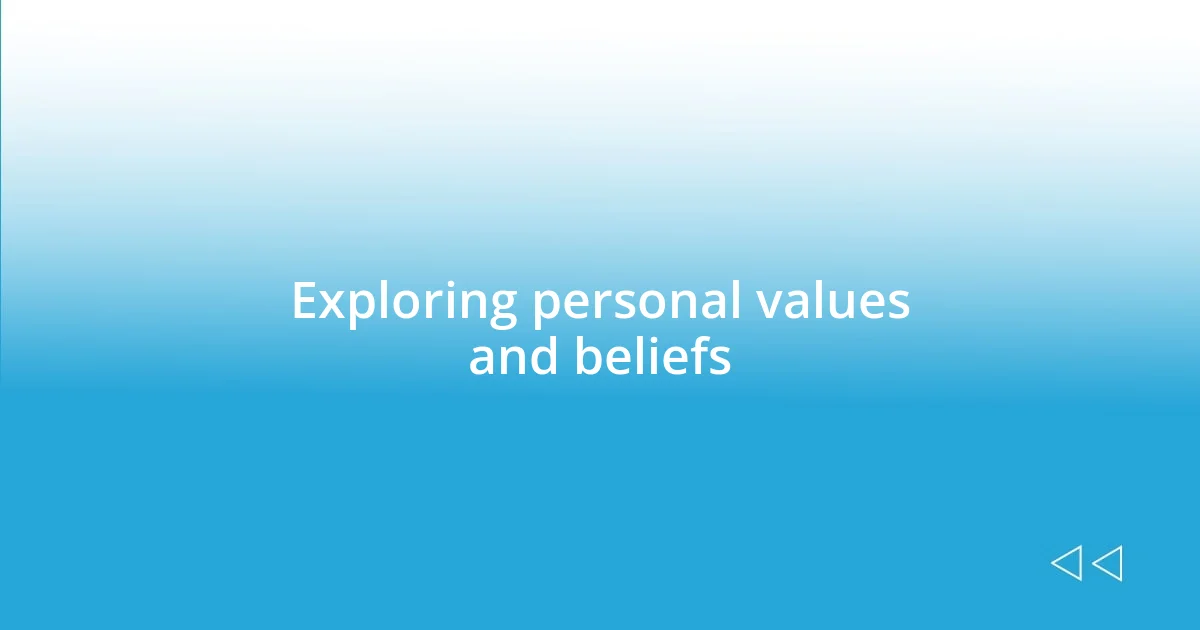
Exploring personal values and beliefs
Exploring my personal values and beliefs has been a transformative aspect of my self-discovery journey. I recall a session where my counselor asked me to identify three core values that resonate with me. It was bewildering at first, as I had never truly paused to reflect on what mattered most. I realized that values like integrity and compassion not only define how I see myself but also guide my decisions and relationships. This discovery felt empowering, almost as if a fog lifted, giving clarity to my path.
Over time, I started to see how my beliefs were shaped by a variety of influences—family, culture, and even social media. I remember a turning point when I confronted a belief I had accepted uncritically: that ambition equates to happiness. In grappling with this, I discovered my genuine belief in a balanced life, one where joy and fulfillment come from nurturing relationships rather than solely chasing achievements. That insight reshaped my priorities, allowing for deeper connections with both myself and others.
As I delved deeper, I uncovered contrasting values where they occasionally led to inner conflict. For instance, my belief in honesty sometimes conflicted with the desire to spare a friend’s feelings. I found journaling to be an effective tool during this exploration. By writing down my thoughts and feelings, I could confront these tensions and seek a resolution. I encourage you to take this approach, as it can reveal much about your own values and beliefs. What do you hold most dear? Unearthing these truths is a crucial step in your self-discovery journey.
| Personal Values | Beliefs |
|---|---|
| Integrity | Honesty is essential to lasting relationships. |
| Compassion | Helping others enhances my own happiness. |
| Balance | Success is not just about achievements but also about joy and fulfillment. |
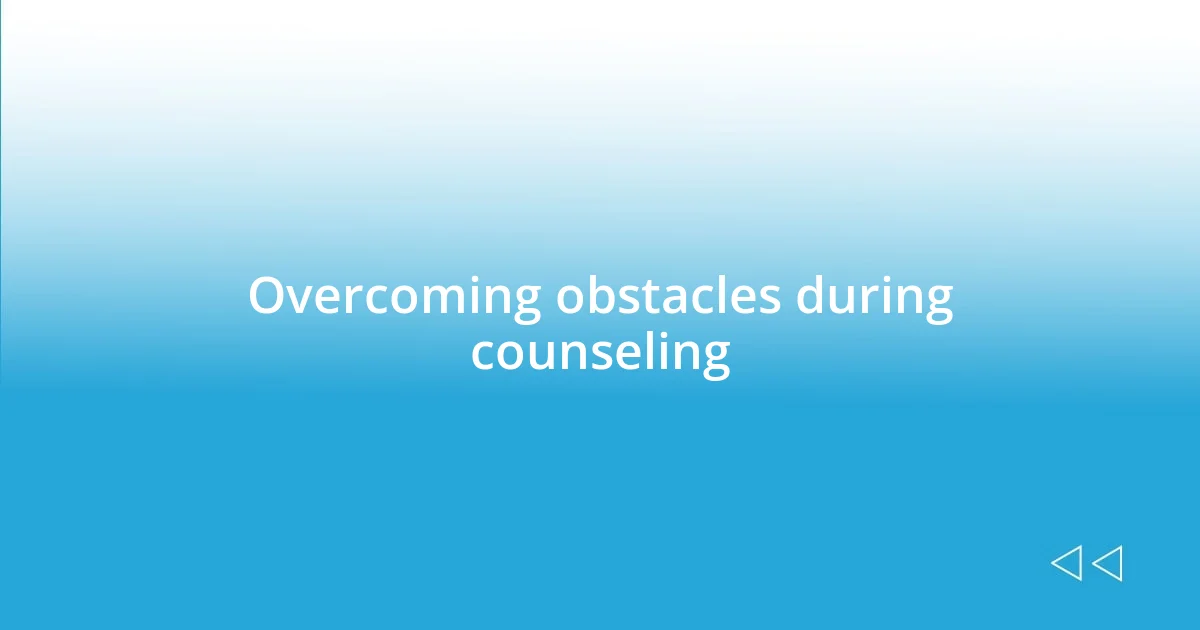
Overcoming obstacles during counseling
As I journeyed through counseling, I faced several unexpected obstacles. One major hurdle was confronting my fear of vulnerability. In one session, I remember sitting in silence, my heart racing at the thought of sharing my deepest struggles. It dawned on me that this fear was a significant barrier. I had to remind myself that vulnerability breeds connection, not just with my counselor, but also with myself.
Another challenge emerged with the discomfort of facing unresolved issues from my past. The emotional heaviness was daunting, almost like dragging a weighted anchor. I found it helpful to take small steps, like breaking down those memories into manageable pieces. It was through this gradual approach that I began to reclaim my power—transforming pain into a source of strength rather than a shadow that lingered over me. Have you ever felt overwhelmed by your past? I discovered that confronting these memories, with my counselor as a guide, made the process less intimidating.
Finally, I encountered resistance to change. I often caught myself feeling comfortable in my old habits, even if they were detrimental. One day, after a particularly enlightening discussion with my counselor about self-sabotage, I realized that embracing change often requires discomfort. By acknowledging my hesitations, I could actively work through them, leading me toward growth instead of staying stuck in familiar, yet restrictive patterns. Change can be scary, but it’s in that very fear that we often find the keys to our personal freedom.
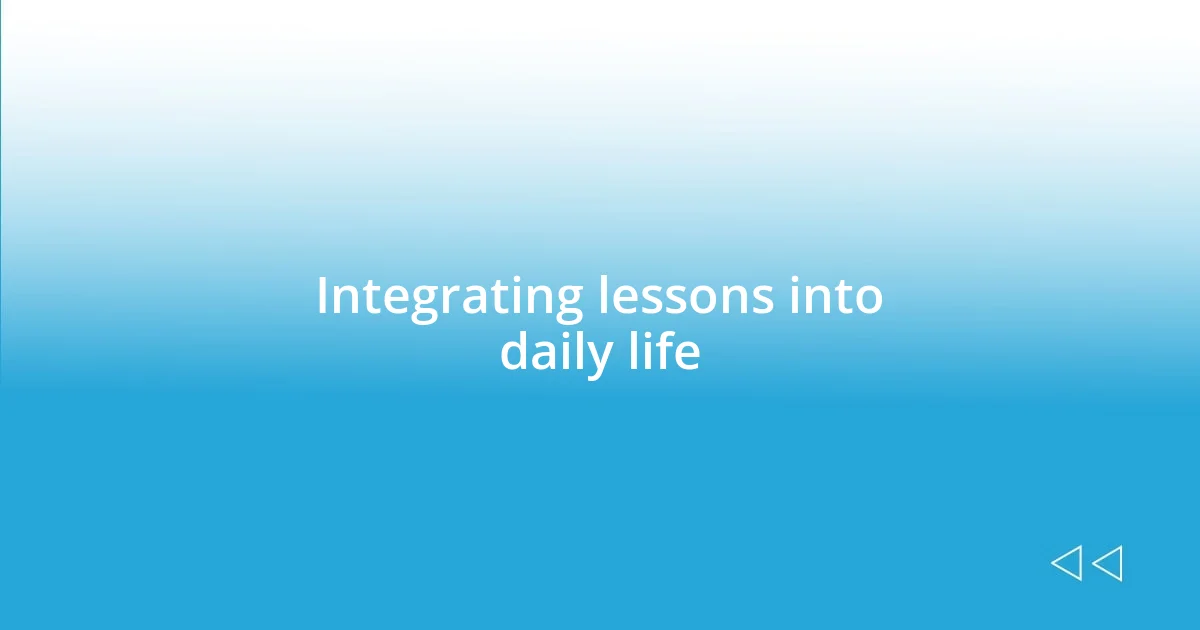
Integrating lessons into daily life
Integrating the lessons I learned in counseling into my daily life was a gradual process, but it was also incredibly rewarding. I vividly recall the first time I consciously applied the concept of self-compassion after a day that didn’t go as I planned. Instead of berating myself for perceived failures, I paused and treated myself with the kindness I would offer a close friend. That simple shift in perspective transformed my inner dialogue and made me more resilient against stress.
One powerful lesson I incorporated was the mindfulness I practiced during sessions. It became a tool I turned to whenever I felt overwhelmed by life’s demands. I remember standing in line at the grocery store, frustration bubbling up as I waited. Instead of letting my impatience take over, I took a deep breath, focused on the sounds and sights around me, and grounded myself in the moment. Have you ever noticed how small things, like your breath or the sounds of your environment, can pull you back into the present? This practice not only reduced my anxiety but also increased my appreciation for the little moments that often go unnoticed.
As I embraced these lessons, I started sharing my journey with others, which created a sense of community and support. Once, during a casual coffee chat with a friend, I shared how journaling had helped me process my emotions. Her eyes lit up, and she admitted she had been struggling to express her own feelings. It dawned on me then that integrating my experiences could spark a ripple effect, encouraging others to embark on their own paths to self-discovery. How amazing is it that our journeys can intertwine, creating a tapestry of growth and understanding?


